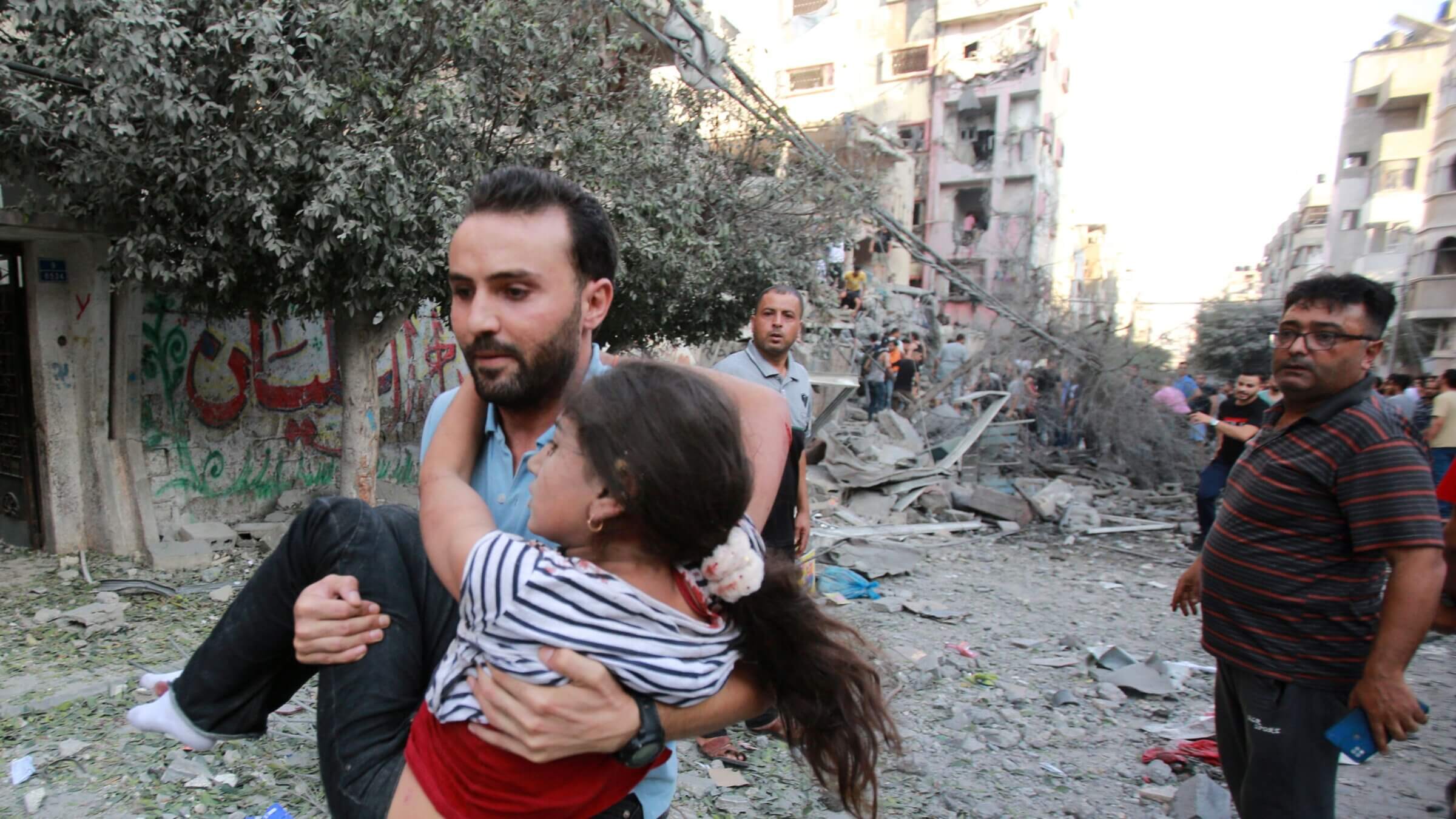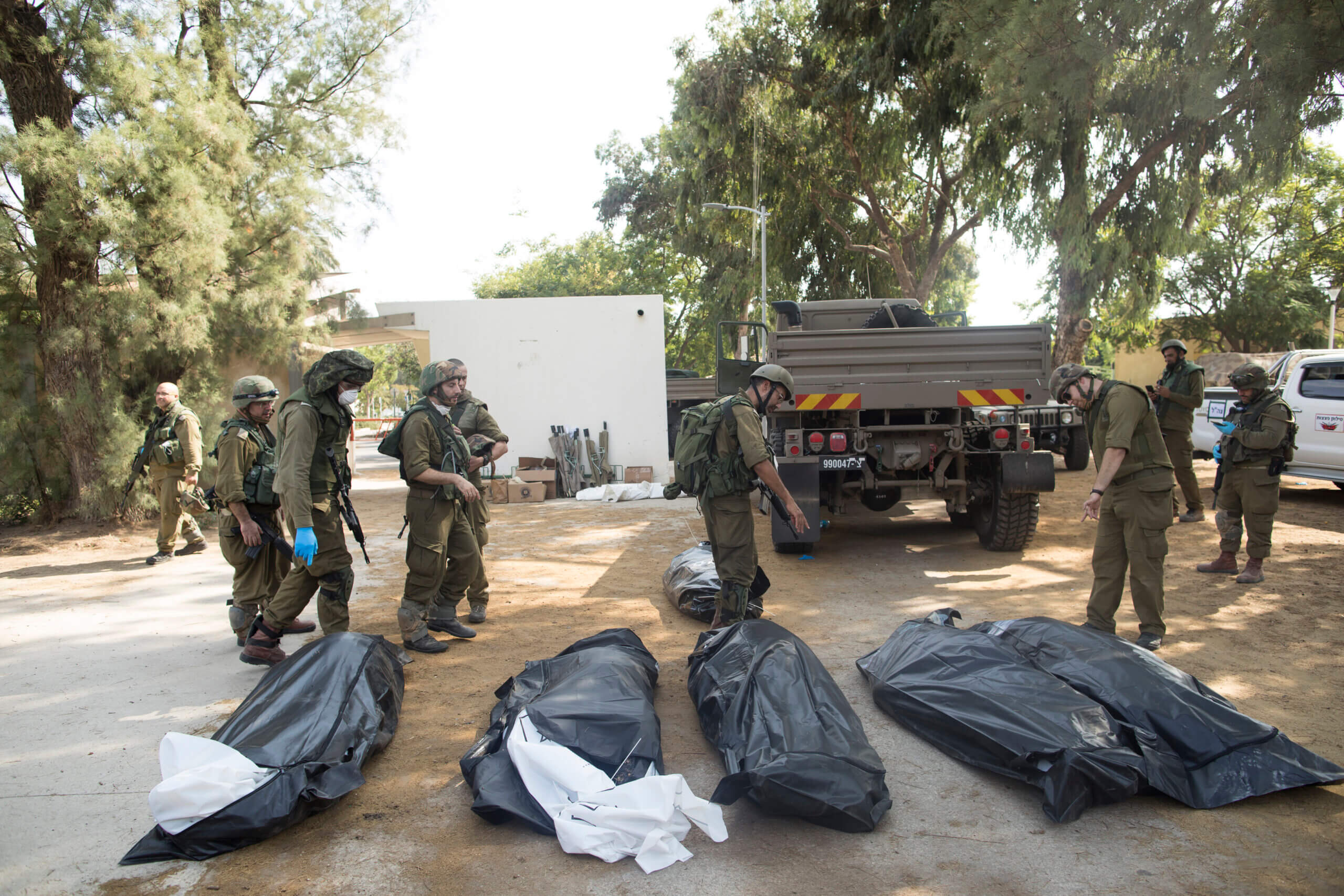Palestinian advocacy groups focus on ‘root cause’ of the Hamas attack. Here’s what they’re trying to convey.
The leading national Palestinian advocacy groups want lawmakers and the public to focus on the plight of Palestinians in their response to the attack by Hamas — and they’re using similar language to make their case

A man evacuates a wounded girl from the site of an Israeli strike on Gaza City on Tuesday. As Israeli airstrikes in response to the Hamas attack on Saturday mount, leading Palestinian advocacy groups are calling on lawmakers to address the “root cause” of the violence — which they argue is the Israeli occupation — rather than relying on a military response. Photo by Getty Images
When American Muslims for Palestine issued their statement on “violence and unrest” in Israel and Gaza Saturday, they did not mention Hamas or Israeli civilian casualties. Instead, they focused on “the root cause of violence” — which they say is Israel.
It’s a rhetorical strategy being used by almost all of the leading Palestinian advocacy groups in the United States, as they seek to sidestep debates among activists over whether the Hamas attack was justified.
“We don’t bother ourselves with justifying what happened because that’s none of our business,” said Osama Abuirshaid, director of American Muslims for Palestine. “We want to inject the Palestinian narrative and say, ‘Look, there is suffering here, too, and it far exceeds the suffering on the other side.’”
That goal has become more urgent for these organizations as Israel seals the border to Gaza and steps up its aerial bombardment of the Palestinian enclave, killing at least 830 Palestinians in retaliatory strikes as of Tuesday. The Israeli military says at least 1,000 Israelis were killed in Saturday’s unprecedented attack, and more than 100 are believed held hostage in Gaza.
“We’re deeply concerned that the administration seems to be giving Benjamin Netanyahu a blank check to do whatever he wants in Gaza,” said Edward Ahmed Mitchell, deputy director of the Council on American-Islamic Relations.
“Peace can only come from addressing the root of the crisis,” he added.
Frequent phrase
Mitchell’s group was one of several, also including U.S. Campaign for Palestinian Human Rights, American Friends Service Committee, IfNotNow and Jewish Voice for Peace that have used language encouraging lawmakers to examine the “root cause” of Saturday’s attack.
Rather than describing the assault as an isolated terrorist attack, these organizations argue that it was the inevitable result of Israel’s tight control of travel and trade into Gaza for nearly two decades. Israel has killed more than 4,000 Palestinians during four major military operations since Hamas took over in 2006.

“We’re calling on our politicians to support a deescalation and to address the root causes of occupation and apartheid,” said Eva Borgwardt, IfNotNow’s political director.
View this post on Instagram
Jewish Voice for Peace, which is anti-Zionist, released a statement Sunday that went viral on Instagram titled: “The Root of Violence is Oppression.”
That language was repeated in the organization’s talking points distributed to members of Congress Monday, a copy of which was obtained by the Forward.
‘Conventional wisdom’
Speaking about the “root cause” of Saturday’s violence is a way for these organizations to acknowledge how objectionable most observers found the attacks on civilians while keeping their advocacy focused on pressuring the Israeli government to make concessions.
Abuirshaid acknowledged that Palestinian organizations had coordinated their advocacy in recent days, but declined to say whether they had intended to use the same language.
“This is the conventional wisdom within the coalition for Palestine and you’re just seeing it expressed in our talking points,” he said.
Abuirshaid said that it was important to highlight the underlying source of the conflict between Israel and the Palestinians — in his view, the Israeli occupation — because a response that only looks at punishing Gaza through military action will inevitably lead to more violence.
“You might be able to devastate Gaza now, you might be able to commit a form of genocide against the Palestinians, but so what?” he asked. “In a few years another generation will come and demand justice.”






















